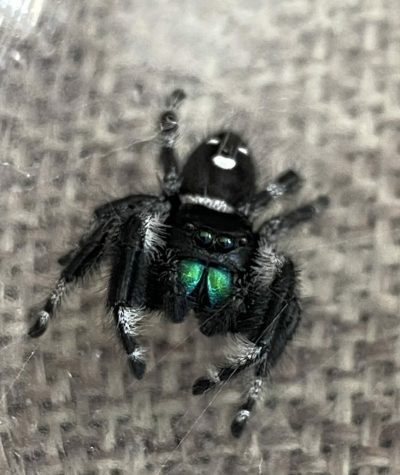Jumping Spider Bites: Everything You Need to Know
Every spider has the ability to bite; this is a fact. It is often their response if they sense danger. But what if a spider bites you?
If you are lucky enough to have never been bitten by a jumping spider, you may be wondering why the big deal. Most spiders are rather small and relatively harmless to humans, right? However, not all are created equal. Some, like the black widow spider, are venomous, and their bites can be fatal.
The jumping spider is one of the most common types of spiders you may come across. We know that they are small and cute. But what happens if you do get bitten by one?
Jumping spiders have small fangs (chelicerae), and their venom rarely harms humans. Their bites will only cause a small amount of pain. In most cases, the pain will go away within a few hours. Remember that jumping spiders are not dangerous to humans, even if they do bite. This is why you can often treat this type of spider bite at home.
Do Jumping Spiders Bite?
As previously mentioned, all spiders can bite, including jumping spiders. It it believed that this is a result of the fight or flight instinct spiders have; when a jumping spider is unable to run – or jump – away, it will try to defend itself. Even bold jumping spiders or regal jumpers, which are the jumping spider species most often kept as pets, can bite their owners from time to time.
Why Do Jumping Spiders Bite?
Jumping spiders, like all spiders, have a fight or flight instinct. When they feel threatened, their first reaction is usually to flee. But if they are unable to escape, they will turn to biting as their last resort. This is common for wild jumping spiders that have found their way indoors; as people try to catch them, these spiders can become afraid and try to defend themselves.
It is understandable why jumping spiders feel threatened when a human approaches them. People are much larger than they are and can easily crush them, so they will bite as a means of self-defense.
What Are the Signs a Jumping Spider Feels Threatened?
There are several signs that a jumping spider may feel threatened and could bite. If you see a spider exhibiting any of the following behaviors, it is best to leave it alone:
- Baring its fangs
- Raising its front legs
- Jumping towards you
The latter two signs can also be the actions of a curious jumping spider preparing itself to leap, so just be cautious.
Are Jumping Spiders Poisonous?
A jumping spider bite is not poisonous. Although some species have vivid colors similar to poisonous spiders, jumping spiders are not dangerous to humans. The venom that they possess is effective against prey, like flies and other small insects, or other spiders, but this venom will rarely cause serious reactions in people.
However, this does not mean that their bite is pain-free for everyone unfortunate enough to be bitten by a jumping spider.
What Are the Symptoms of a Jumping Spider Bite?
The symptoms of a jumping spider bite are similar to those of a bee sting. You may experience sharp pain at the spider bite location.
You might be wondering what a jumping spider bite looks like. Generally, the area may be red and swollen, and you might experience itching, too. It is also possible for small dots to be visible from the spider’s fangs, but this is rare. What jumping spider bite symptoms you experience might differ, depending on the severity of the bite and your sensitivity to jumping spider venom. Bites from adult jumping spiders might also be more painful due to their larger size; this is also likely for some species of female jumping spiders.
If you are allergic to bee stings, you may have a more serious reaction to a jumping spider bite. Symptoms of an allergic reaction include difficulty breathing, swelling of the face or throat, and dizziness. If you experience any of these symptoms, you should seek medical attention immediately.
How to Treat Jumping Spider Bites
If your pet jumping spider has bitten you, then you should be able to treat it using home remedies. The most common method of treating a jumping spider bite is shown below:
- Use soap and warm water to wash the bite wound. This will prevent infection later on by removing any bacteria.
- If you experience swelling or a burning sensation at the bite site, then you can apply a cold compress, like an ice pack, for 10-15 minutes. This can help relieve itching and ease any inflammation and/or redness.
- You should apply antibiotic ointment if a welt appears; this might look similar to a mosquito bite.
- If symptoms do not subside after 24-48 hours, you might want to seek medical attention. You might be suffering from an allergic reaction to spider venom or it might not be a jumping spider bite after all.
How Can You Avoid Being Bitten by Your Pet Jumping Spider?
The most effective way to prevent your jumping spider biting you is to handle them sparingly and with care. They are small creatures and can be easily injured. It is also important to remember that humans are considerably bigger than jumpers, and these little spiders might find your size intimidating.
You should also avoid putting your hands or fingers near their mouthparts. This is where their fangs are located and is the easiest way for them to bite you. During feedings, if you usually hand-feed your pet spider prey, you might want to invest in a small set of feeding tongs; this kit will increase the distance between your fingers and the spider, helping you avoid being bitten.
If you find a wild jumping spider in your house, you can use a cup or glass to trap it, slide a piece of paper underneath, and carry the spider outside. This avoids touching the spider and risking a bite. You can also use this method if your pet spider escapes and you are not confident catching it by hand.
In short, the best way to avoid being bitten by your pet jumping spider is to use common sense and be cautious when handling them. For more information on how to correctly handle your pet jumping spider, click here.

